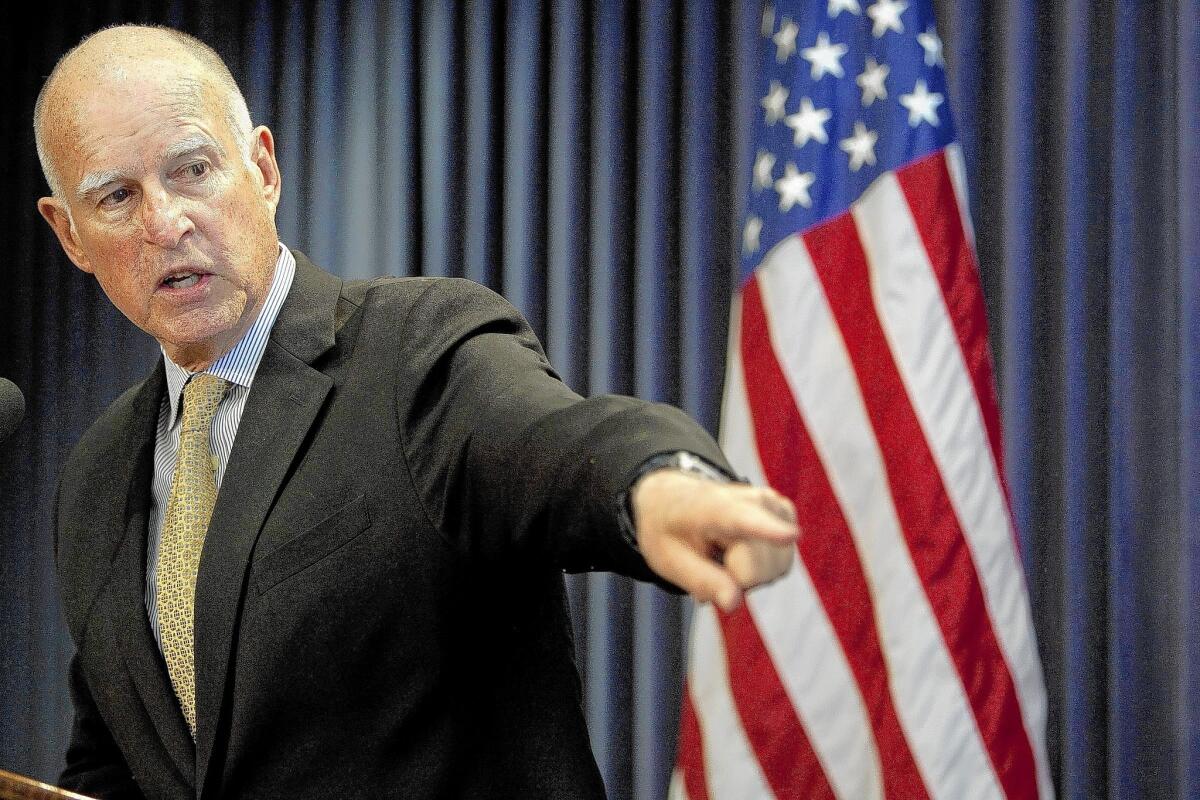Gov. Jerry Brown likes to break the mold with his judicial picks

- Share via
Reporting from San Francisco — As he mulls over candidates for the California Supreme Court, Gov. Jerry Brown has shown a willingness to break from tradition and draw from a wider pool of attorneys than previous governors.
In making a batch of appointments last weekend to two appellate courts, Brown chose both experienced jurists and a neophyte, suggesting he would cast a wide net to fill two seats on the seven-member state high court.
For decades, the court has had only one Democratic appointee, but Brown will soon have three people of his choosing on the court, and if re-elected, he may get a fourth in a second term.
Jon Eisenberg, a Northern California appellate lawyer, said he was struck by Brown’s willingness to appoint attorneys without judicial experience to appellate courts, rather than having the appointee climb the ranks up from Superior Court.
Brown tapped Chief Deputy San Francisco City Atty. Therese M. Stewart, one of the leaders’ in California court battles for gay marriage, for the San Francisco-based 1st District Court of Appeal. Stewart, who has never been a judge, will become the state’s first openly lesbian justice.
“Jerry Brown really likes smart people,” Eisenberg said. “That’s what this tells me. It is a very unusual thing to be appointed directly to a Court of Appeal.”
Dennis A. Fischer, another longtime California appellate lawyer, noted that Brown’s picks for the Los Angeles-based appeals court were all sitting judges, suggesting he considers bench experience valuable. But that is not likely to be a requirement for the state high court, he added. “Brown thinks outside the box,” said Fischer, a past president of the California Academy of Appellate Lawyers.
Stewart, 57, successfully defended San Francisco’s decision in 2004 to marry gay couples without a court order permitting it. She later helped persuade the California Supreme Court to overturn the state’s marriage ban in 2008 and was part of the legal team that brought the marriage challenge to the U.S. Supreme Court.
At the same time Brown appointed Stewart, he elevated Justice James M. Humes to be a presiding jurist on the San Francisco-based appeals court, even though Humes had no judicial experience before joining the court about a year and a half ago.
Humes, who worked in Brown’s office before being appointed by him to the court, was the state’s first openly gay man to become an appellate justice. He served as a trusted deputy to Brown in Sacramento, and analysts say the governor is clearly fast-tracking him.
Though Humes has been mentioned as a possible candidate for the state Supreme Court, Brown is under pressure to appoint a Latino or African American. His first pick this term was Justice Goodwin Liu, a UC Berkeley law professor who had never been a judge and had a moderately liberal record.
Stewart said she was worried she might be perceived by the Brown administration and bar evaluators as “one-dimensional” because she has been so closely identified with same-sex marriage litigation. Her 32 years of practice have included commercial and public law litigation.
“I am a progressive, but a thoughtful progressive, and I am not a knee-jerk anything,” Stewart said. “I never have been.”
Brown’s recent appointments to the Los Angeles-based 2nd District Court of Appeal were more traditional.
He elevated Justice Frances Rothschild to a presiding justice, moved Los Angeles Superior Court Judge Brian M. Hoffstadt to the Appeals Court and promoted Justice Lee S. Edmon to a presiding justice. Brown also appointed U.S. District Judge Audrey B. Collins, an African American, to the appellate court.
Only Collins’ appointment stood out. She is 69, and governors tend to appoint younger justices who are likely to have longer tenures on the court.
“I can’t think of anybody in all my years who was appointed to the Court of Appeal and was older than 62,” Eisenberg said. “But after all, who is going to tell Jerry Brown you are over the hill at 69?”
Fischer said all of the Los Angeles appointees were highly regarded, and not one would be considered ideological. “They are middle of the road,” the appellate lawyer said.
The openings on the state’s high court were created by the retirement of former Justice Joyce L. Kennard in April, and a decision by Justice Marvin Baxter to retire in January, when his current terms expires.
Santa Clara University Law Professor Gerald Uelmen said Brown has an incentive to name Baxter’s replacement first in September and Kennard’s after the November election.
Because the justices serve for specified terms, that timing would permit each of the new members to stand for only one election for a full 12-year term, Uelmen said.
All of Brown’s appointments to the appellate court are expected to be confirmed by the Commission on Judicial Appointments, which is headed by Chief Justice Tani Cantil-Sakauye. The other two members who will vote on the new justices are Atty. Gen. Kamala D. Harris and a senior presiding justice of the appellate court for which the candidate has been nominated.
State Court of Appeal justices earn $207,463 a year.
Twitter: @mauradolan
More to Read
Sign up for Essential California
The most important California stories and recommendations in your inbox every morning.
You may occasionally receive promotional content from the Los Angeles Times.











